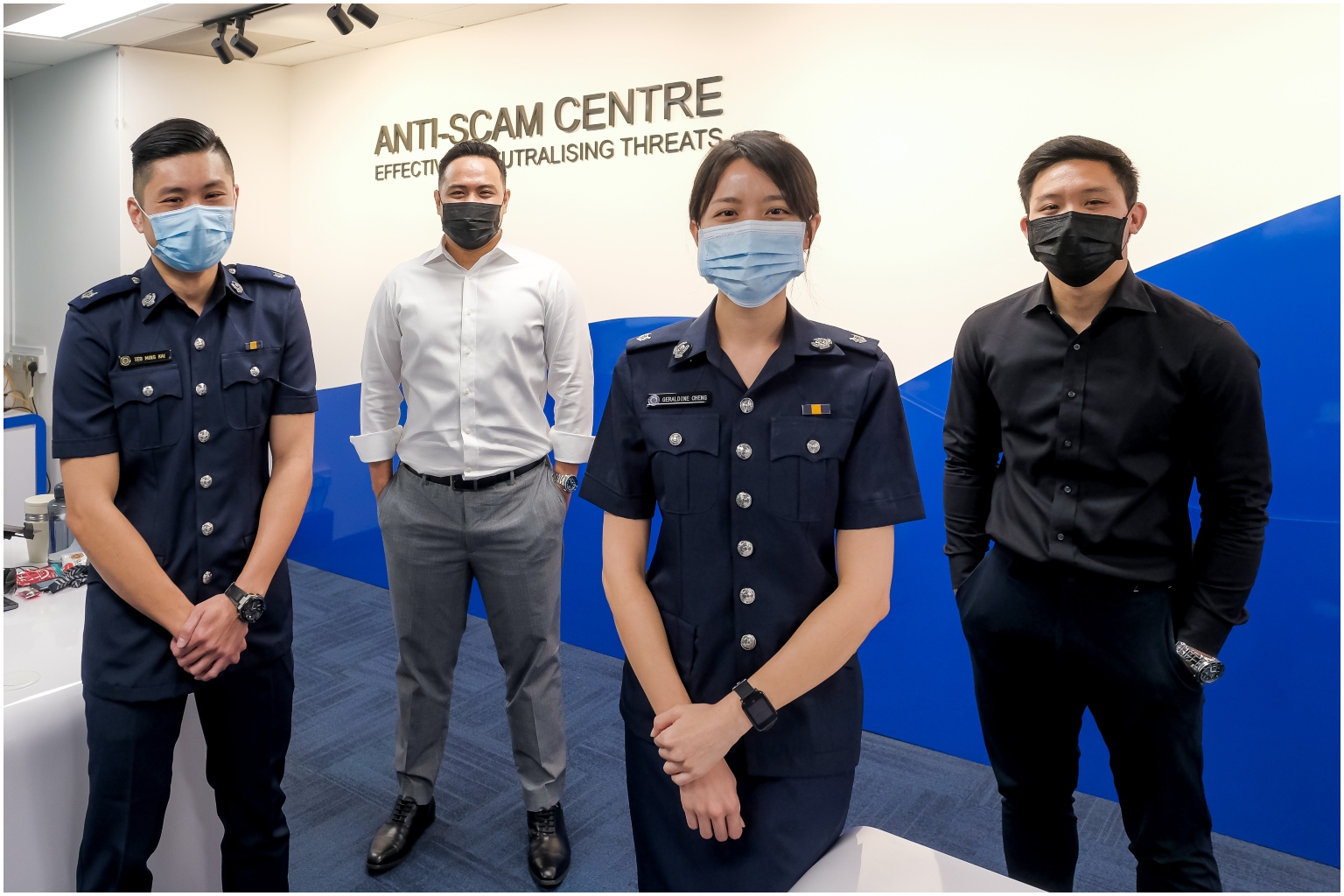Many parties involved to help just one scam victim: Anti-scam officers
Sign up now: Get ST's newsletters delivered to your inbox

(From left) ASP Teo Ming Kai, Mr Yaznisham Bin Yazid, ASP Geraldine Cheng, and Mr Nicolas Soong, at the Anti-Scam Centre in Police Cantonment Complex.
PHOTO: ST FILE
SINGAPORE - Many scam victims think getting their lost money back is a simple process and assume banks or the police can block their accounts and reverse any transaction once they lodge a report.
But in reality, it may take several hours just to have an account frozen, and requires cooperation from multiple stakeholders to help just one victim, said the officers and staff at the police's Anti-Scam Centre (ASC).
And even then, success is never guaranteed, they added.
Scam victims here lost at least $633.3 million last year.
The police had frozen more than 12,600 bank accounts and were able to recover more than $102 million that was lost to scams.
The ASC said when someone calls the anti-scam hotline (1800-722-6688) managed by the National Crime Prevention Council (NCPC), someone like Mr Nicholas Soong, 29, answers.
The NCPC anti-scam hotline officer said victims are usually flustered, angry and can be quite aggressive.
Said Mr Soong: "They are anxious and impatient, and not so willing to explain their situation, but instead demand we find them immediate solutions.
"We explain to them if they aren't calm, the information they give us may not be accurate, and such information is critical in aiding police investigations."
The NCPC is a non-profit organisation, but works closely with the Singapore Police Force and the ASC. In 2020, its officers handled more than 9,100 hotline calls.
Officers like Mr Soong are tasked with not just speaking to victims who call in, but also filtering and flagging urgent cases to the police at the ASC for immediate action.
But there are other complications.
Assistant Superintendent of Police (ASP) Geraldine Cheng, 32, an officer-in-charge at the centre, said victims often feel overwhelmed.
In some instances, if their case was flagged by a family member or friend, the victims may not believe they have been scammed.
"Victims are often already groomed and brainwashed by scammers prior to the engagement," she said.
She added many victims also have their own psychological biases, refusing to believe they would ever fall for a scam and are blinded by shame and embarrassment.
Officers will meet victims physically if they are unable to convince them over the phone.
Sometimes, victims not only lose their own money, but find themselves unwittingly used as money or document mules for the scammers.
In January, three foreign students were jailed for between seven and 18 months after they became involved with a transnational money mule syndicate.
Laws will be amended in the fourth quarter of this year to allow for more money mules with lower culpability to be prosecuted.
ASP Cheng explained while it takes a scammer just seconds to make transactions to numerous accounts, officers have to comb through dozens - sometimes hundreds of such transactions - carefully, taking significantly more time.
She said: "The scammers intentionally complicate the fund flows by layering with multiple conduits within a matter of seconds and sometimes across multiple countries."
ASP Teo Ming Kai, 33, a senior investigation officer with the centre, said freezing a bank account is also not straightforward.
He said: "The bank accounts fall under the custody of the respective banks, and so the police do not have immediate access to these accounts."
The police have to first accurately identify the relevant bank accounts, and work with the banks to freeze them, he added.
The length of this process varies depending on the case, and details of exactly how this is done cannot be revealed publicly because of operational sensitivities.
ASP Teo said because the police will always have to go through the banks, having bank staff located in the ASC was important.
Mr Yaznisham Yazid, 29, a member of the DBS Bank anti-scam team inside the ASC, said being there allows the freezing of compromised DBS bank accounts to be done quickly, and vital information can be shared directly with officers there.
He added: "This is a very time-sensitive process, hence we have a dedicated fraud team on standby 24/7."
There are still limits to what the banks can do, such as when the money is transferred out of Singapore.
He said: "Typically, once the funds are transferred overseas by scammers, the chances of recovery are very low.
"The fight against scams is a shared responsibility. All of us, including banks, telcos, SMS aggregators and customers, need to do our part."
The scam reporting process:
- Immediately notify your bank and lodge a police report online via this website, or at any neighbourhood police centre. You can also call the anti-scam hotline on 1800-722-6688.
- Officers will ask for more details to better identify the type of scam encountered and lodge the report accordingly.
- Victims may be asked how they became acquainted with the scammers, and for transaction details such as amounts transferred, date and time of the transactions, beneficiary accounts and how the transaction was made.
- An investigation officer will be assigned to the case and the Anti-Scam Centre will be notified immediately.
- The centre will work with stakeholders like banks to trace and attempt to recover funds for victims.
- This often involves the police asking the bank to freeze the relevant accounts.
- The banks will also try to furnish other details to the police.
- Victims will be updated when there are significant developments regarding their case.



